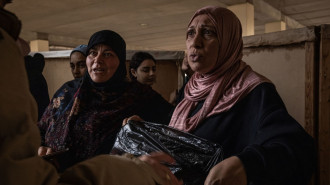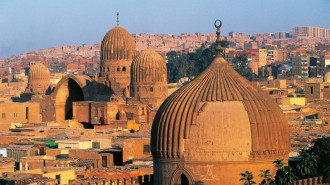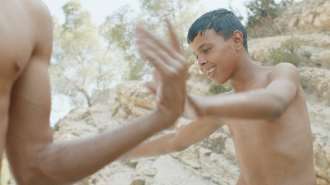
Embroidery beyond borders: Shatila refugee camp's Tatreez workshop

The faint sound of tuktuk’s beeping, children playing and distant construction work seeps into the room through the slightly ajar door.
There is a slight murmuring among the women, who are all indulging in coffee and cake to celebrate a joyous occasion. A photographer named Mohamed snaps a portrait of a young lady called Farah who smiles down the lens.
Others begin to make their way to the cushions on the floor in the corner, being welcomed personally by Aziza who gestures to them to make themselves comfortable.
They all find a place before being addressed by another lady, Manar, who gives an introductory speech as to the importance of this meeting today and thus commences the Shatila refugee camp’s first-ever Palestinian Tatreez women’s workshop.
"Quite frankly, it’s a love story. Between the string and the needle. I used to find it strange how women would sit patiently for a long time doing Tatreez. But now I get it"
Tatreez is the Arabic word for a form of cross-stitch embroidery, unique to Palestine, and a cornerstone of its culture for millenniums.
The craft centres around stitching different coloured strings on patches of fabric, creating innovative patterns and designs, all of which have strong symbolism and tell stories about their history and heritage.
“Quite frankly, it’s a love story. Between the string and the needle. I used to find it strange how women would sit patiently for a long time doing Tatreez. But now I get it,” Aziza, the embroidery teacher of the women, tells The New Arab.
As well as being an art form, through the course of history Tatreez has evolved into a form of resistance. The Nakba – the Palestinian catastrophe of 1948, which resulted in the expulsion of 750,000+ Palestinians from their homeland – was the sole reason for the establishment of the Shatila Refugee Camp in Beirut, Lebanon, and it’s at the heart of this camp where this workshop was taking place.
“Through this Tatreez project, I feel as though I am doing this to serve the Palestinian cause, and how do I serve it? By preserving our cultural traditions, because Israel’s aim is to erase Palestine and anything Palestinian from the world," says Manar, the organiser of the project.
Having had no right to return to their ancestral homeland, a right that is still being denied to the millions of Palestinian refugees worldwide, the women have held onto their identity through Tatreez.
"Through this Tatreez project, I feel as though I am doing this to serve the Palestinian cause... because Israel’s aim is to erase Palestine and anything Palestinian from the world"
Every region of the country had a specific design or pattern, each being quite distinguishable from the others. It is this imagery that has since become immediately recognisable to many across the globe as being Palestinian.
After months of preparation, the seeds of a beautiful initiative were planted, empowering women and giving them the opportunities to earn a living for their families.
The workshop doesn’t only serve as a space for enterprise, but it has been opened to the women as a safe haven and a place for community, where they can enjoy each other’s company and provide moral and emotional support for each other.
Manar stresses the importance of the space holistically for women. “It’s also a safe space for all the women. This is the most important thing.”
Farah, one of the aspiring embroiderers narrates, “Although it’s my first time, it feels like we have known each other for a long time. We hope that more people see what we are doing and that this project gains more and more support over time and is able to continue. We want our voice and skills to reach many more people for us to be able to reach our goals.”
From my own perspective, the most beautiful thing about the workshop and the camp was the unity among Palestinians, Syrians and Lebanese people.
Shatila refugee camp was set up solely for Palestinians after 1948, but since the start of the Syrian Civil War, there has been a large influx of Syrian refugees who now inhabit the camp, alongside some Palestinians who are the fourth generation to be born there.
“The thing I love about Shatila is that there is no difference between a Palestinian, a Syrian or a Lebanese. We are all one heart and one family,” says Izdihar, another embroiderer-to-be and a Syrian refugee.
"The thing I love about Shatila is that there is no difference between a Palestinian, a Syrian or a Lebanese. We are all one heart and one family"
For her, the workshop is especially important on a social level and gives her the freedom she had been yearning for so long. “I never used to leave the house at all. I used to always spend my time at home. Here I have nobody at all except them. They are all my sisters. I am so thankful for the opportunity to be involved in this.”
As the session continues, each woman begins their Tatreez journey with a single piece of fabric, and they are instructed to use green string and practice the technique of embroidering a straight line. They giggle and laugh among each other as they experience trial and error, some being more naturally in tune with a needle than others. I’m asked to be a judge between the straight green lines of three women, and which looks best, to which I respond that there is beauty in each.
Manar watches on like a proud mother of the young women, seeing all of their hard work come to fruition.
She’s excited about the future of the project and what can be achieved. “We hope to reach a stage where we finish teaching Tatreez and training to then start working and selling. For every woman to gain an income from their own hard work.”
The dream is for the workshop to be fully self-functioning and for the pieces sold to cover the costs of electricity, internet and other expenses as well as provide a wage for women who’d otherwise struggle to find employment.
“I thank everyone who helped support this project, brought smiles to our faces and gave us hope for the future. We hope to have more support to continue this project going forward,” Manar concludes.
It was a heart-warming experience witnessing the birth of such a beautiful project, hopefully, the future brings further support to allow the continuation of the Shatila refugee camp Tatreez Workshop.
Saoud Khalaf is a British-born Iraqi filmmaker and writer based in London. His videos, which have garnered millions of views across social media, focus on social justice for marginalised groups with specific attention on the Middle East. His latest documentary premiered at the Southbank Centre for Refugee Week.
Follow him on Twitter: @saoudkhalaf_
![Aziza, pictured here teaching Tatreez embroidery to a group of women [photo credit: Mogajitsu]](/sites/default/files/styles/medium_16_9/public/2022-10/Untitled%281%29_0.jpg?h=d1cb525d&itok=-Ly3wJTf)
![The room where the Tatreez workshop takes place in Beirut's Shatila refugee camp [photo credit: Mogajitsu]](/sites/default/files/styles/medium_16_9/public/2022-10/Untitled_12.jpg?h=d1cb525d&itok=nKLTJpx0)
![Farah, one of the new joiners to the workshop [photo credit: Mogajitsu]](/sites/default/files/styles/medium_16_9/public/2022-10/Untitled%282%29.jpg?h=d1cb525d&itok=5tCr_ohs)
![Palestinians mourned the victims of an Israeli strike on Deir al-Balah [Getty]](/sites/default/files/styles/image_684x385/public/2024-11/GettyImages-2182362043.jpg?h=199d8c1f&itok=xSHZFbmc)


![The law could be enforced against teachers without prior notice [Getty]](/sites/default/files/styles/image_684x385/public/2178740715.jpeg?h=a5f2f23a&itok=hnqrCS4x)
 Follow the Middle East's top stories in English at The New Arab on Google News
Follow the Middle East's top stories in English at The New Arab on Google News


